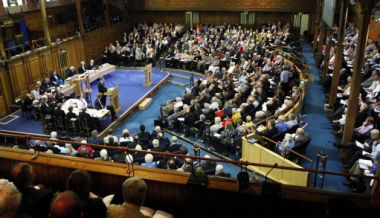The politics of spin in the Church

Christian Today carried a story last week about the somewhat strange alliance between the Church of Scotland and the Humanist Society of Scotland, seeking to remove religious observance from Scottish state schools. This was followed by another story that amounted to a retraction. Apparently it had all been a misunderstanding caused by misreporting. There was to be no removal of religious observance, it was just to be a name change and anyway the Church could not decide to do such a thing without first of all consulting its General Assembly. End of story.
Except it wasn't. In fact the whole story is a classic example of what happens when the Church seeks to use politics and of spin that then spins out of control. I was deeply involved in all of this because I regularly debate with the Secular Society of Scotland and the Humanist Society, and I have many friends within the Church of Scotland who could not believe that their Church was committing suicide.
Last Friday I was sent the joint press release that the Church of Scotland and the Humanist Society were putting out. It was very clear what was being proposed. In response to the Secular Society's petition for religious observance in Scottish schools to be 'opt-in' rather than opt-out, as it currently is, the humanists and the Church of Scotland were proposing to the Scottish Parliament that religious observance should be replaced with 'a time for reflection'.
They helpfully added footnotes to the press release that explained that this would be non-confessional and would not include Christian worship and prayers. This was described as 'journeying together' towards their common goal. Although given that the Humanists have as their goal the eradication of religion from society and the Church, the promotion of it, it is difficult to see what that common goal actually is.
A further disturbing aspect of this was in the Church's joint letter with the humanists to the Scottish parliament stating, "Both the Church of Scotland and the Humanist Society Scotland also believe that requiring external visitors to schools to agree with the equality and diversity policy of the school, or local educational authority, would ameliorate situations which have arisen in the past."
In modern Britain equality and diversity policy is not there to promote equality and diversity but to ensure that those who do not agree with the new absolutist state morality are excluded. In this case the attempt is being made to prevent Bible-believing Christians like yours truly from getting access into schools. The traditional role of school chaplain (usually held by a Church of Scotland minister) is being replaced by that of chaplaincy teams (often including staff from the growing evangelical churches). The humanists want to have their chaplains as well and so this deal to have what in effect would amount to a humanist state religion imposed upon Scotland's schools was struck.
The notion of the Church of Scotland petitioning the Scottish Parliament together with the Humanist Society caused even hardened secular journalists to muse with astonishment. Professor Donald Macleod of the Free Church put it succinctly in the West Highland Free Press – "the Church of Scotland [is] guilty of total capitulation, aggravated by the fact that they are the official representatives of the Christian faith of the Scottish people... How can a body professedly committed to converting men and women to faith in Jesus Christ describe as 'colleagues' a society committed to promoting atheism?"
The Times carried the story on its front page, quoting extensively from a blog I had written on the subject (you can get it here and the two subsequent ones which contain all the relevant press releases). And the Church panicked as its ordinary members, elders and ministers realised what was being done in their name. One minister wrote and told me of how some in his congregation wept when they heard about this debacle. So another press release was put out saying that it was just a symbolic name change. The original press release was removed from the Church website and those of us who had reported on it were accused of misrepresenting and misreporting.
The Church of Scotland then said it would be up to the Assembly to decide, although the decision had already been made to sign the joint letter and to make a joint approach to the Scottish Parliament. The humanists got wind of this U-turn and were so upset at what they understandably regarded as a betrayal of their agreement, that they did not go to the Scottish Parliament together as planned. Although the original letter and submission apparently still stands.
The whole thing has been a sorry and sordid mess – a classic illustration of how not to do politics or church politics in our post-Christian society. Our state Churches may often find themselves in the situation where they cannot obey both Caesar and Christ. At that point they have to decide whether they really want to be the Church of Jesus Christ, or just the spiritual branch of the secular state. The latter may carry some degree of worldly privilege and status. The former has the beauty of eternal glory. It's a choice that I suspect all of us will increasingly be called to make.











